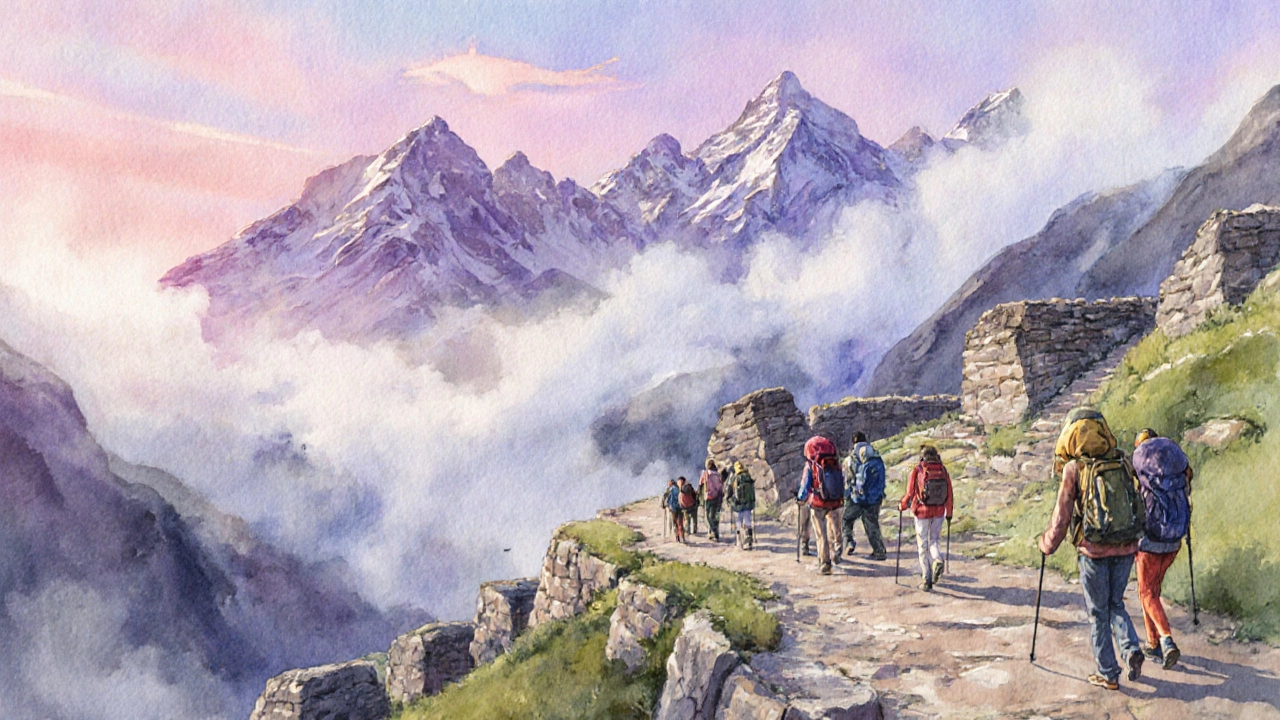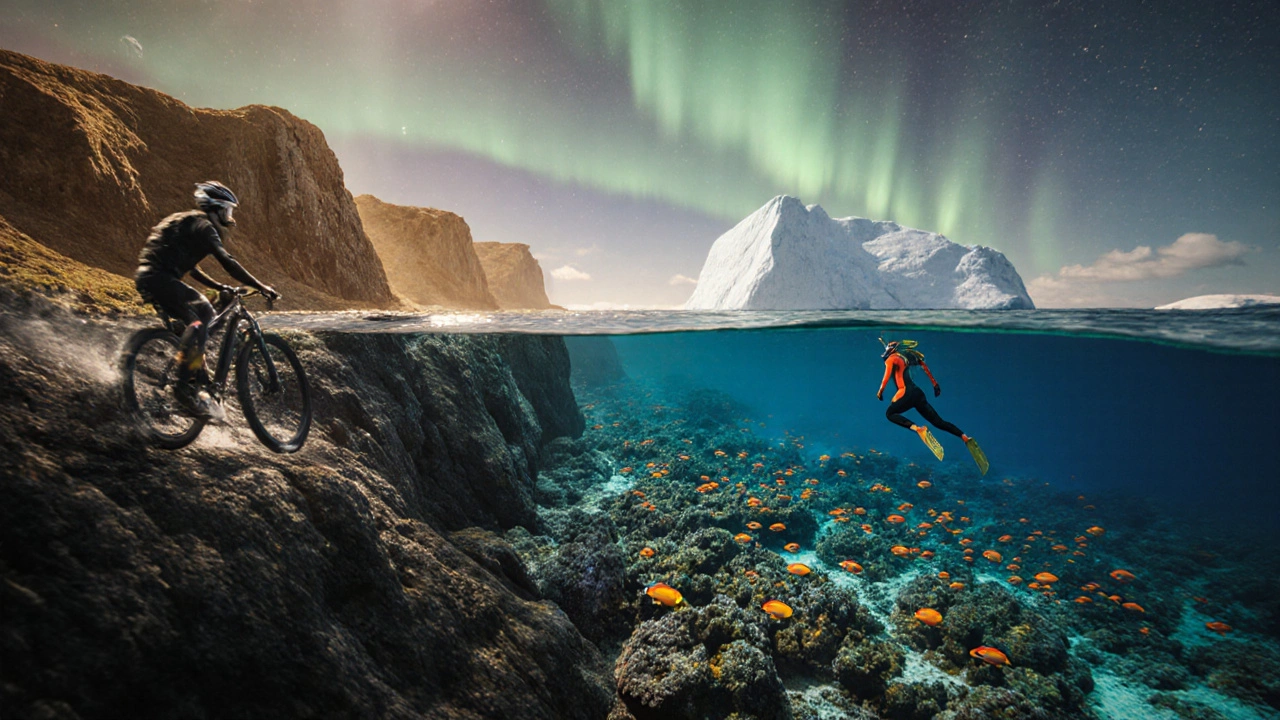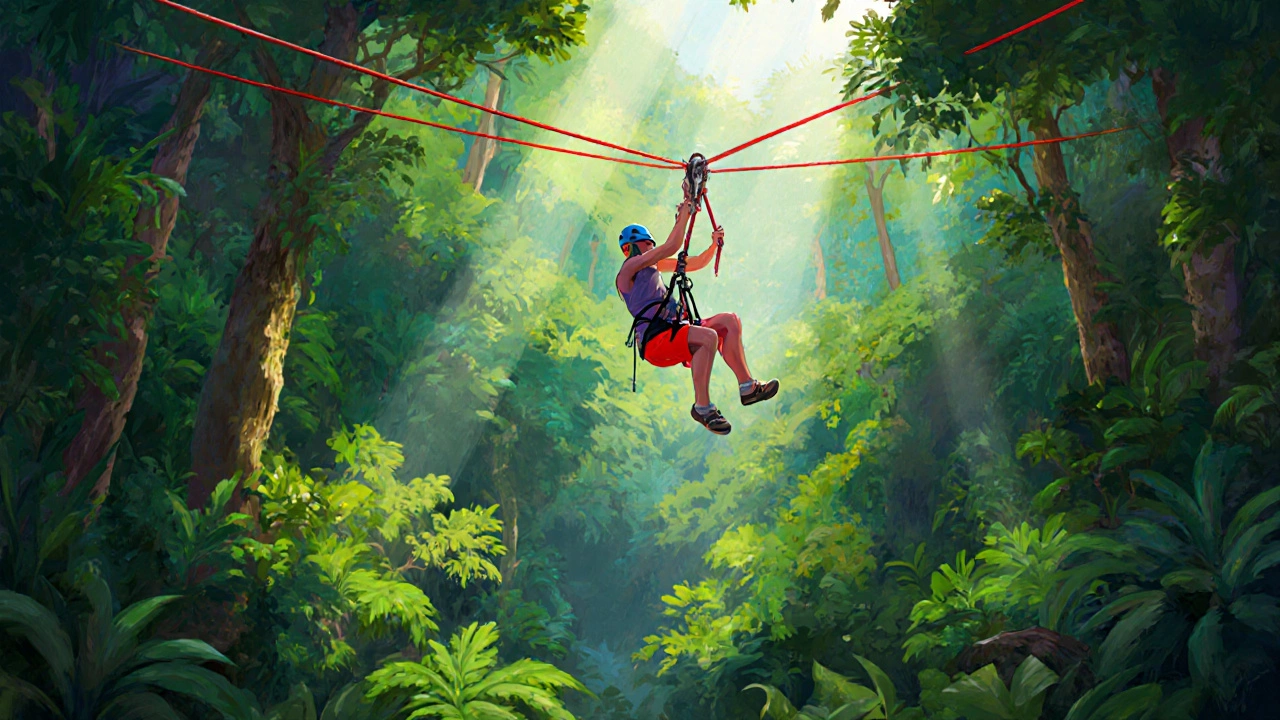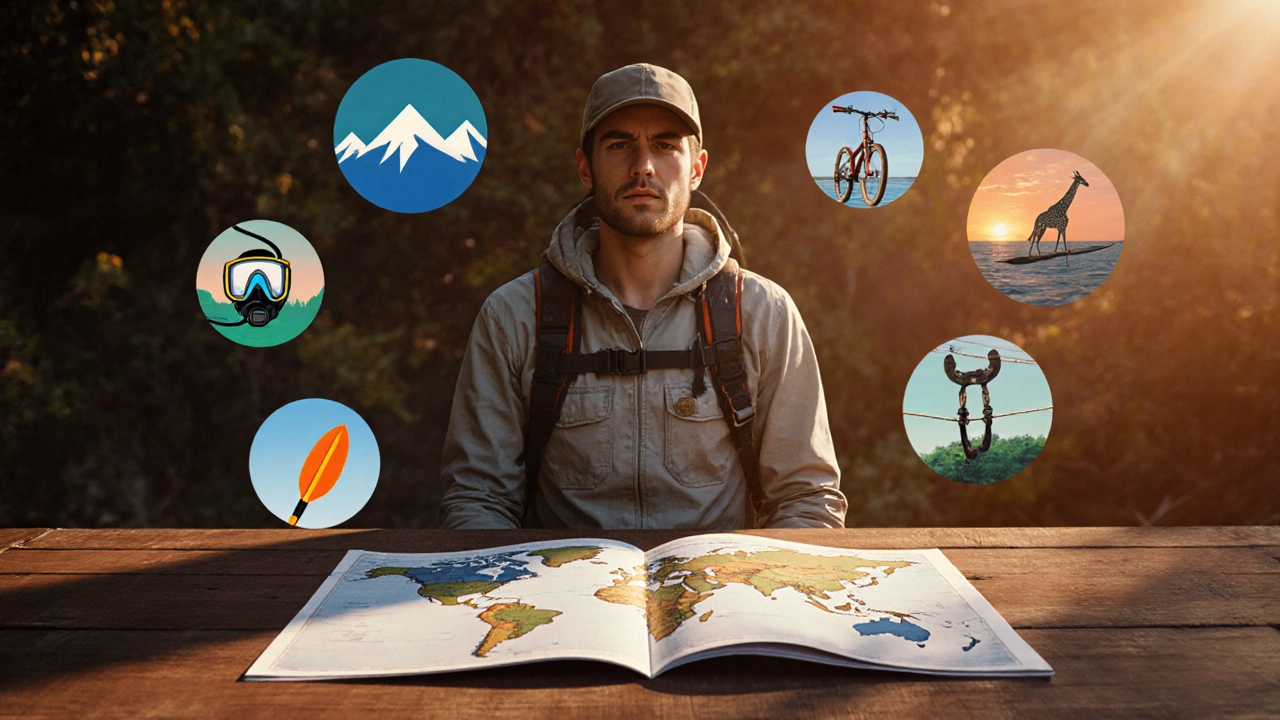Adventure Holiday Finder
Select your preferences to find adventure holidays that match your ideal trip.
Recommended Adventure Types
Tip: Many adventure holidays combine multiple activities. Consider combining a kayaking trip with a wildlife safari for a complete experience.
Quick Takeaways
- Adventure holidays cover everything from trekking in the Andes to scuba diving in the Great Barrier Reef.
- Pick a type based on activity level, climate, and how far you want to go off‑the‑beaten‑path.
- Budget ranges widely - a weekend kayaking trip can cost under £200, while a polar expedition may run into thousands.
- Safety gear, local guides, and travel insurance are non‑negotiable for most adventure trips.
- Many adventure holidays can be combined - think a bike‑tour that ends with a wildlife safari.

Understanding Adventure Holidays
Adventure holidays is a form of travel that centers on physical activity, discovery, and often remote or challenging environments. Whether you crave altitude, ocean depth, or jungle trails, the core idea is stepping out of the comfort zone and into nature’s playground. The rise of experiential travel means more operators now offer packaged experiences, but the essence remains the same: you, the activity, and the landscape.
Major Types of Adventure Holidays
Trekking & Hiking Holidays
Trekking holidays are long‑duration walks that take you across mountain ranges, valleys, or historic trails. Classic routes include the Inca Trail in Peru, the Annapurna Circuit in Nepal, and the Appalachian Trail in the US. Typical difficulty ranges from moderate (4‑6days, light packs) to strenuous (10‑+days, high altitude).
Safari & Wildlife Adventures
Safari holidays focus on observing animals in their natural habitats. East Africa’s Serengeti, South Africa’s Kruger, and Botswana’s Okavango Delta remain top choices. Many safaris blend game drives with walking or boat excursions, giving you a multi‑sensory wildlife experience.
Scuba Diving & Marine Exploration
Scuba diving holidays let you plunge into coral reefs, wreck sites, and underwater caves. Popular destinations include the Maldives, the Red Sea, and Mexico’s Yucatán Peninsula. Certification (e.g., PADI Open Water) is a prerequisite for most trips, and dive operators usually provide gear rentals.
Mountaineering & High‑Altitude Trips
Mountaineering holidays involve technical climbing, often above 3,000m. Iconic peaks such as Kilimanjaro, Aconcagua, and the Dolomites attract climbers seeking altitude and summit glory. Guided groups supply ropes, helmets, and acclimatization schedules.
Kayaking & Canoeing Expeditions
Kayaking holidays take you down rivers, across lakes, or along coastal coastlines. The Canadian Rockies, Norway’s fjords, and Vietnam’s Ha Long Bay showcase everything from white‑water thrills to serene paddling.
Zip‑Lining & Canopy Tours
Zip‑lining adventures let you soar through forest canopies on steel cables. Costa Rica, Malaysia, and the US Pacific Northwest host world‑class courses that blend adrenaline with rainforest views.
Polar & Arctic Expeditions
Polar holidays bring you to the Earth’s extreme latitudes. Whether you join an ice‑breaker cruise to Antarctica or a dog‑sled trek across Greenland, these trips demand robust gear, a high tolerance for cold, and often a longer travel lead‑time.
Cycling & Mountain‑Bike Tours
Cycling holidays cover everything from gentle vineyard rides to rugged mountain‑bike traverses. The French Alps, Taiwan’s east coast, and Colorado’s Rocky Mountain routes provide varied terrain for all fitness levels.
Volunteer & Community‑Based Adventures
Volunteer travel blends hands‑on work with cultural immersion. Projects include wildlife rescue in South Africa, reef restoration in Belize, and reforestation in Nepal. The focus is impact, and many tours pair service days with local excursions.

Choosing the Right Type for You
Start with three questions:
- How much physical effort are you comfortable with? If you prefer low‑impact, think kayaking or wildlife safaris. For high‑effort, trekking, mountaineering, or cycling are better fits.
- Which climate excites you? Warm seas suit diving; cold deserts suit polar trips.
- What’s your budget and time frame? Weekend zip‑lining can be under £300, while a two‑week polar cruise easily tops £6,000.
Match your answers against the table below to narrow down the best options.
| Type | Typical Activity Level | Best Regions | Average Cost (7‑day) | Skill/Experience Needed |
|---|---|---|---|---|
| Trekking & Hiking | Moderate‑High | Andes, Himalayas, Appalachian | £800‑£2,000 | Basic fitness, optional acclimatization |
| Safari & Wildlife | Low‑Moderate | East Africa, South Africa, Botswana | £1,200‑£3,000 | No prior experience |
| Scuba Diving | Moderate | Maldives, Red Sea, Caribbean | £1,500‑£3,500 | PADI Open Water certified |
| Mountaineering | High | Kilimanjaro, Aconcagua, Dolomites | £2,500‑£5,000 | Technical climbing skills, fitness |
| Kayaking / Canoeing | Low‑Moderate | Canadian Rockies, Norwegian fjords, Vietnam | £600‑£1,500 | Basic paddling ability |
| Zip‑Lining | Low | Costa Rica, Malaysia, Pacific NW | £300‑£800 | No experience required |
| Polar Expeditions | Variable (often moderate) | Antarctica, Greenland, Iceland | £4,000‑£9,000 | Cold‑weather gear, health clearance |
| Cycling Tours | Moderate‑High | French Alps, Taiwan, Colorado | £1,000‑£2,500 | Bike handling, endurance |
| Volunteer Adventures | Low‑Moderate | South Africa, Belize, Nepal | £800‑£2,200 | Open‑mind, basic skills for project |
Planning Tips & Budget Hacks
- Book early for peak seasons. Safaris in July‑August and polar cruises in December fill up fast.
- Use local guide platforms (e.g., Viator, GetYourGuide) to compare prices and read real‑user reviews.
- Travel insurance that covers adventure sports is a must; many policies add a £50‑£100 deductible for high‑risk activities.
- Pack light, but don’t skimp on essential gear - a good pair of waterproof hiking boots or a reliable dry‑bag can save you thousands in rental fees.
- Consider off‑season trips. A Patagonia trek in November costs up to 30% less than the December‑January rush.

Frequently Asked Questions
What is the safest type of adventure holiday for beginners?
Guided wildlife safaris and zip‑lining tours are low‑impact, come with professional guides, and require minimal prior skill, making them ideal entry points.
Do I need special insurance for adventure travel?
Yes. Look for policies that explicitly cover activities like climbing, scuba, and polar expeditions. Standard travel insurance often excludes high‑risk sports.
How can I keep costs down without sacrificing experience?
Travel in shoulder seasons, join group tours, and use local transport instead of private transfers. Booking accommodation a few weeks in advance can also unlock early‑bird discounts.
What gear is essential for a kayaking expedition?
A waterproof dry‑bag, a personal flotation device (PFD) with a whistle, paddle, and a quick‑dry jacket. If you’re tackling white‑water, add a helmet and spray skirt.
Can I combine two adventure types in one trip?
Absolutely. Many itineraries blend trekking with wildlife spotting (e.g., hiking the Masai Mara’s savannah) or cycle‑tour a coastal region and finish with a scuba dive session.
Next Steps & Troubleshooting
If you’re stuck choosing a destination, start with a simple online quiz that matches your fitness level, budget, and climate preference. For gear worries, rent locally - most reputable tour operators include gear in the price or partner with nearby outfitters.
Encountered a travel‑restriction issue? Check government advisories early and consider flexible‑booking providers that allow date changes without hefty fees.
Finally, remember that adventure travel is as much about mindset as mileage. Embrace the unknown, stay prepared, and you’ll come back with stories worth sharing for years.
